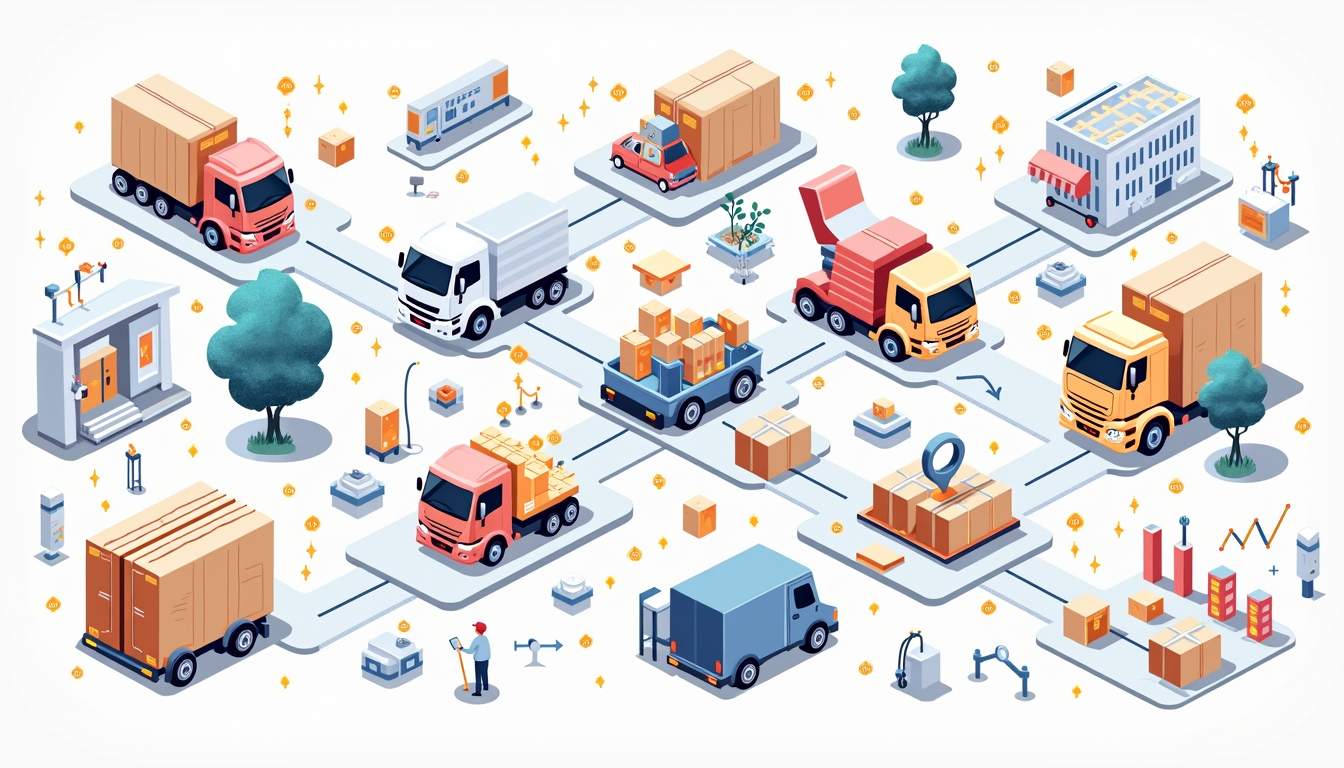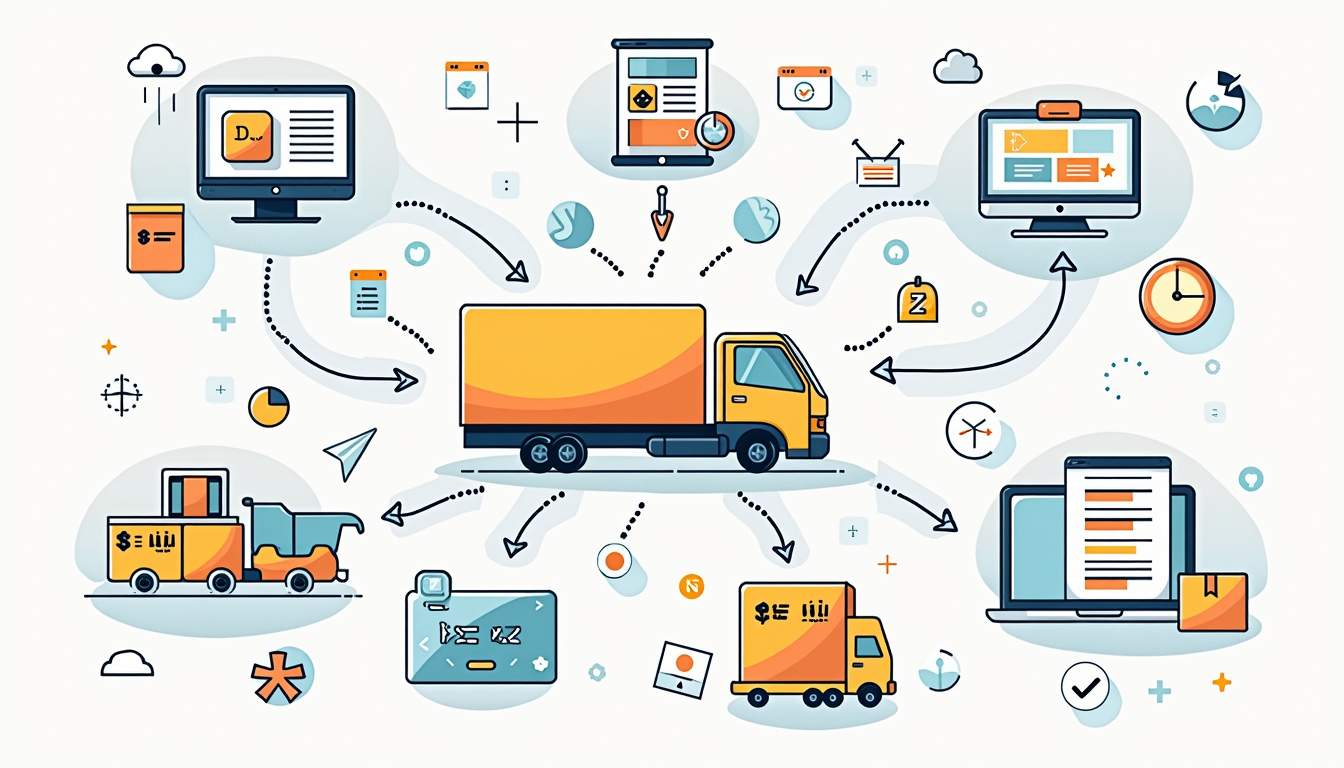Ecommerce logistics is a crucial aspect of the online retail landscape, encompassing the entire process of order fulfillment, from the moment a customer clicks “buy” to the delivery of the product at their doorstep. Understanding the logistics process is essential for businesses aiming to optimize their operations and enhance customer satisfaction. This article delves into the various components of ecommerce logistics, exploring supply chains, software solutions, essential hardware, and industry-specific logistics practices.
Understanding Ecommerce Supply Chains
Definition of Ecommerce Supply Chain
The ecommerce supply chain refers to the network of processes and activities involved in delivering products from suppliers to customers in the online marketplace. This chain includes various stages such as sourcing, storage, order processing, and shipping. Each link in the chain plays a vital role in ensuring that products are available to meet customer demand in a timely manner.
In a traditional retail environment, customers can physically browse products, but in ecommerce, the supply chain must compensate for the lack of physical interaction. This means that businesses must rely heavily on efficient logistics to ensure that customers receive their orders quickly and accurately.
Key Components of Supply Chains
Several key components make up an effective ecommerce supply chain. These include inventory management, warehousing, order fulfillment, and transportation. Each component must work seamlessly together to create a smooth experience for both the business and the customer.
Inventory management involves tracking stock levels and ensuring that products are available when needed. Warehousing is where products are stored before they are shipped, and effective order fulfillment processes ensure that orders are processed quickly and accurately. Finally, transportation is the final leg of the journey, delivering products to customers’ doorsteps.
Software Solutions for Ecommerce
Inventory Management Software
In the fast-paced world of ecommerce, having robust inventory management software is essential. This type of software helps businesses track inventory levels, manage stock across multiple locations, and forecast demand. By utilizing such tools, companies can reduce the risk of stockouts and overstock situations, ultimately leading to improved customer satisfaction.
Modern inventory management systems often integrate with other software solutions, such as order processing and shipping tools, creating a cohesive ecosystem that streamlines operations. This integration allows for real-time updates and better decision-making based on accurate data.
Order Processing Tools
Order processing tools are another critical aspect of ecommerce logistics. These tools automate the order fulfillment process, from receiving orders to managing returns. By automating these tasks, businesses can reduce human error, speed up processing times, and enhance the overall customer experience.
Many order processing solutions also offer features like tracking and reporting, allowing businesses to monitor performance and identify areas for improvement. This data-driven approach helps companies make informed decisions that can lead to greater efficiency and profitability.
Essential Hardware for Logistics
Barcode Scanners and Printers
In ecommerce logistics, accuracy is paramount, and barcode scanners and printers play a crucial role in achieving this. Barcode scanners allow warehouse staff to quickly and accurately track inventory, ensuring that the right products are picked and shipped. This technology minimizes errors and speeds up the fulfillment process.
Barcode printers are equally important, as they create labels that contain essential product information. These labels help streamline the shipping process and ensure that packages are delivered to the correct addresses. Together, these tools enhance operational efficiency and contribute to a more organized warehouse environment.
Warehouse Management Systems
A warehouse management system (WMS) is a software solution that helps businesses manage their warehouse operations more effectively. A WMS provides tools for inventory tracking, order picking, and shipping, allowing companies to optimize their storage space and improve order accuracy.
By implementing a WMS, businesses can gain better visibility into their inventory levels and streamline their processes. This technology not only enhances operational efficiency but also supports better decision-making regarding inventory management and order fulfillment.
Services Supporting Ecommerce
Third-Party Logistics Providers
Third-party logistics (3PL) providers are essential partners for many ecommerce businesses. These companies specialize in managing logistics functions such as warehousing, order fulfillment, and shipping. By outsourcing these tasks to a 3PL, businesses can focus on their core competencies while benefiting from the expertise and resources of logistics specialists.
3PL providers often have established networks and relationships with carriers, allowing them to negotiate better shipping rates and delivery times. This can lead to significant cost savings and improved service levels for ecommerce businesses.
Shipping and Delivery Services
Shipping and delivery services are the final link in the ecommerce logistics chain. These services ensure that products reach customers in a timely and efficient manner. Various shipping options, including standard, expedited, and same-day delivery, cater to different customer needs and preferences.
Choosing the right shipping partner is critical for ecommerce success. Factors such as reliability, cost, and delivery speed should be considered when selecting a shipping service. Additionally, offering multiple shipping options can enhance the customer experience and drive sales.
Ecommerce Logistics by Industry
Retail Sector Logistics
The retail sector is one of the most prominent users of ecommerce logistics. With the rise of online shopping, retailers must adapt their logistics strategies to meet customer expectations for fast and reliable delivery. This often involves implementing sophisticated inventory management systems and partnering with efficient shipping providers.

Retailers also face unique challenges, such as managing seasonal demand fluctuations and handling returns. Effective logistics solutions can help retailers navigate these challenges and maintain a competitive edge in the market.
Food and Beverage Logistics
The food and beverage industry presents its own set of logistics challenges, primarily due to the perishable nature of products. Ecommerce logistics in this sector must prioritize speed and temperature control to ensure that products reach consumers in optimal condition.
Companies in this industry often rely on specialized logistics providers that understand the unique requirements of food transportation, including compliance with safety regulations and maintaining the cold chain. By leveraging these services, businesses can ensure that their products are delivered fresh and safe for consumption.
Use Cases for Ecommerce Logistics
B2C Ecommerce Fulfillment
B2C (business-to-consumer) ecommerce fulfillment is one of the most common use cases for ecommerce logistics. This involves delivering products directly to consumers, often requiring fast shipping and efficient order processing. Companies must have robust logistics systems in place to handle high order volumes and meet customer expectations for delivery speed.

Many B2C businesses utilize fulfillment centers that specialize in processing online orders. These centers are designed to handle the unique challenges of ecommerce, such as managing returns and providing real-time tracking information to customers.
B2B Supply Chain Strategies
B2B (business-to-business) supply chain strategies differ significantly from B2C fulfillment. In B2B logistics, companies often deal with larger order volumes and longer lead times. Effective logistics solutions must accommodate these differences while ensuring timely delivery and maintaining strong relationships with business partners.
Many B2B companies leverage technology to streamline their supply chain processes, using tools such as inventory management systems and analytics to optimize their operations. By focusing on efficiency and accuracy, businesses can enhance their competitiveness in the B2B marketplace.
Tools for Efficient Management
Analytics and Reporting Tools
Analytics and reporting tools are essential for businesses looking to optimize their ecommerce logistics. These tools provide valuable insights into key performance metrics, such as order processing times, shipping costs, and inventory turnover rates. By analyzing this data, companies can identify trends and areas for improvement.

Effective use of analytics can lead to better decision-making and more efficient operations. Businesses can adjust their logistics strategies based on data-driven insights, ultimately enhancing customer satisfaction and driving growth.
Automation Solutions in Logistics
Automation solutions are revolutionizing ecommerce logistics by streamlining various processes and reducing the need for manual intervention. From automated order processing to robotic picking systems in warehouses, automation can significantly enhance efficiency and accuracy.
By implementing automation technologies, businesses can reduce labor costs, minimize errors, and improve order fulfillment speeds. This not only benefits the company but also enhances the overall customer experience, leading to higher satisfaction and loyalty.
Education and Training Resources
Online Courses for Supply Chain Management
As ecommerce logistics continues to evolve, education and training resources are becoming increasingly important. Online courses for supply chain management offer valuable insights into the latest trends, technologies, and best practices in the industry.
These courses cater to a range of skill levels, from beginners to experienced professionals looking to enhance their knowledge. By investing in education, individuals and businesses can stay ahead of the curve and adapt to the ever-changing logistics landscape.
Industry Certifications and Qualifications
Obtaining industry certifications and qualifications can provide a competitive advantage in the field of ecommerce logistics. Certifications demonstrate a commitment to professional development and can enhance career prospects for individuals in the logistics sector.
Many organizations offer certifications that focus on various aspects of supply chain management, including logistics, inventory management, and transportation. By pursuing these qualifications, professionals can gain credibility and increase their value in the job market.
Ecommerce Order Fulfillment Processes
Understanding the ecommerce order fulfillment process is essential for businesses looking to optimize their logistics operations. This process typically involves several stages, including order receipt, inventory allocation, picking, packing, and shipping.
Each stage must be executed efficiently to ensure timely delivery and customer satisfaction. By leveraging technology and best practices, businesses can streamline their fulfillment processes and enhance their overall logistics performance.
In conclusion, ecommerce logistics is a multifaceted field that plays a critical role in the success of online businesses. By understanding the components of the logistics process and implementing effective strategies, companies can improve their operations, enhance customer satisfaction, and drive growth in the competitive ecommerce landscape.
Take Your Ecommerce Logistics to New Heights with Freighter Gator
Maximize the efficiency and reliability of your ecommerce logistics with Freighter Gator’s specialized air cargo charter solutions. Designed for businesses that demand speed and flexibility, our global services ensure your time-sensitive shipments arrive exactly when needed. From emergency parts to oversized equipment, trust us to elevate your logistics strategy. Ready to experience seamless air freight services? Request a Quote today and keep your business soaring above the competition.
